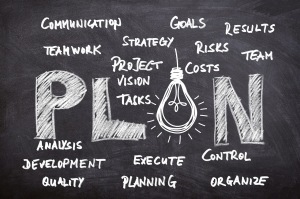2024
Insights from the leadership planet by Eve and Eli
2024 is soon coming to an end. Often a lot of things need to be finalized before Christmas (work wise as well as in our private lives). Everything needs to be done near to perfect, and the clock is ticking. It can become a very stressful period.
When we get stressed, it impacts the part of our brain called the Amygdala – one of the oldest parts of the brain which plays a big role in processing emotions, especially fear, threats and stress. Acute stress triggers and increases Amygdala activity. This enhances the brain’s ability to detect potential dangers and initiate a fight-or-flight response. This is of course very helpful in immediate survival situations, but not necessarily in our day-to-day life. Chronic stress can lead to an overactive Amygdala, making you more sensitive to perceived threats and prone to anxiety, can lead to difficulties to focus and sleep.
So how can we help to calm down the activity level in our Amygdala?
An interesting experience is taking place in a laboratory at the Max Planck Institute in Berlin, where the brain researcher Sonja Sudimac is scanning the brains of a group of 63 individuals to investigate what happens in their amygdala, the part of the brain that is supposed to warn us of dangers, when they are in different environments. One thing that is researched is what happens in our brain if we take a walk. Taking a walk is of course good - we get out and we get some exercise. But taking an hour's walk in an urban environment led to continued high activity in an already stressed amygdala. After an hour's walk in the forest, the activity in the amygdala had decreased significantly.
So, when you are stressed try to fit in a walk but make sure to use the power of the green areas. You are not always close to a forest but perhaps you have a green park nearby where you can give your brain a chance to calm down and re-charge.
Make sure to take care of yourself and your brain so that you can fully enjoy the coming Christmas break.
More to come from Insights from the Leadership Planet by Eve and Eli
Insights from the leadership planet by Eve and Eli
Hybrid teams are here to stay. After the pandemic this is the new normal – mixed teams with team members working on site, hybrid or even remote. More and more companies are though deciding that they want their employees to be more in the office, well at least three days a week. So, hybrid will be the new normal and in this new environment good leaders are critical.
Leaders need to manage hybrid teams, allowing their employees to work both remotely and in the office. They need to execute some leadership traits probably both better as well as clearer.
Therefore, what do you need to think about a bit extra as a leader:
- make sure you establish clear rules of engagement and developing daily rituals so that everyone knows what is expected. Is this new – no – but it become even more important when you do not have the time to see your employees daily.
- avoid virtual micromanagement and trust that employees will get the job done.
- equip you employees with the skills they need to succeed now as well as in the future by providing appropriate development.
- encourage your employees to contribute to the team spirit by connecting with colleagues in the office and with remote colleagues. Leaders cannot be the only glue to create connection and belonging.
- to ensure that employees working remotely have the right tools to be able to do the work in an effective way.
- make sure to handle meeting facilitation effectively by for instance clear agenda, restating, and summarizing office conversations to clarify for those on the phone or video chat.
Finally, leaders need to continue to develop themselves in order to improve retention, engagement and performance behaviors. It will be key to manage the hybrid workplace and hybrid teams in an effective manner.
What do you need to develop to be an effective hybrid leader?
More to come from Insights from the leadership planet by Eve and Eli
Insights from the leadership planet by Eve and Eli
In the fast-paced world of leadership, where data-driven decisions and logic often reign supreme, there’s an often-overlooked superpower: intuition. In fact, intuition is much more present in our life than what we think or are aware of. It is a knowledge that comes from old ages, when we were living in caves having to deal with animals around and huge uncertainty.
Intuition is the silent whisper that nudges us toward certain choices. It’s not a mystical force but rather an innate ability we all possess. Imagine it as your internal compass, guiding you through the fog of uncertainty. Let’s explore what intuition truly is:
- The Subtle Signal: Intuition doesn’t shout; it whispers but so deeply that you know you’re right! It’s that inexplicable feeling when for example you meet someone and sense their authenticity or discomfort. It’s the hunch that nudges you toward a decision, even when data points elsewhere.
- Beyond Rationality: Intuition transcends logic. While analysis and facts have their place, intuition taps into deeper wisdom. It’s the bridge between conscious thought and subconscious insight.
- Body and Mind: Intuition isn’t just in your head; it resonates throughout your body. Pay attention to physical sensations—an uneasy stomach, a racing heart—when making choices. Research as demonstrated that your body often knows before your mind catches up.
- Practice and Trust: Cultivating intuition takes practice, like a muscle. Quiet moments, meditation, and self-reflection help. Trust it—especially when it defies conventional wisdom. Intuition thrives when you listen without judgment.
Connecting to your inner compass could completely transform your leadership journey, it brings so many opportunities for development:
- Empathy and Connection: Intuition enhances your ability to empathize and connect with others. By tuning into your instincts, you better pay attention to others, ask more questions and understand better team members’ feelings, needs, and motivations.
- Creativity and Innovation: Intuitive leaders think beyond the obvious. They’re not bound by rigid frameworks.
- Big-Picture Focus: Intuition helps you keep your eyes on the horizon. While details matter, intuitive leaders maintain perspective and keep an eye on their environment.
- Authentic Decision-Making: Trusting your intuition means aligning with your core values, connecting to your inner self. When ego steps aside, conscious choices emerge.
- Navigating Complexity: In our century of complexity and overload of information, intuition acts as a compass. It guides you through uncertainty, helping you respond to challenges with clarity and grace.
So, embrace and train this quiet force. It’s your compass, pointing toward purpose and authenticity.
More to come from Insights from the leadership planet by Eve and Eli
INSIGHTS FROM THE LEADERSHIP PLANET
by Eve and Eli
We have been asked to many times “do you think I should take a coach”… any time someone asks this question, without needing further explanation, the answer is YES, not because we will do more business it is just because if you’re asking the question, you are deeply and sometimes not consciously needing help.
We’ve decided to list all the powerful reasons why you should take a coach… Maybe you find one (or more!) which sounds a (big) bell:
- Combat Executive Isolation: As you climb the corporate ladder, feelings of isolation and loneliness can increase due to the unique stress and responsibility. An executive coach not only addresses specific issues but also helps mitigate these feelings by connecting you with others who share similar experiences.
- Build Thought Leadership: An executive coach can guide you in shaping your personal brand. They help you decide how to present yourself on platforms like LinkedIn, identify conferences to speak at and develop strategies to enhance your online presence.
- Refine Executive Presence: Improve your communication skills and influencing abilities. Coaches assist with presentations, one-on-one meetings, and team interactions, allowing you to elevate your executive presence1.
- Operate in Your Zone of Genius: Contrary to the misconception that coaches only focus on weaknesses, they also help you identify and leverage your strengths. By emphasizing your fabulousness, you can excel in your leadership role.
- Holistic Development: An executive coach takes a comprehensive approach to your growth. They focus not only on professional skills but also on personal development. By addressing both, you become a more well-rounded leader.
- Strategic Thinking: Coaches encourage strategic thinking. They help you step back, analyze situations, and make informed decisions. This skill is crucial for navigating complex business landscapes.
- Emotional Intelligence: Effective leadership requires emotional intelligence. Coaches guide you in understanding your emotions, managing stress, and building strong relationships with your team.
- Accountability and Goal Setting: Coaches hold you accountable for your goals. They help you set clear objectives, track progress, and adjust strategies as needed.
- Conflict Resolution: Leaders often face conflicts. Coaches equip you with conflict resolution techniques, ensuring a harmonious work environment.
- Adaptability: In today’s dynamic world, adaptability is key. Coaches help you embrace change, learn from failures, and stay agile.
Remember, investing in an executive coach isn’t a sign of weakness—it’s a commitment to continuous improvement and exceptional leadership!
Here a question to you - When do you start???
More to come from INSIGHTS FROM THE LEADERSHIP PLANET by Eve and Eli
INSIGHTS FROM THE LEADERSHIP PLANET by Eve and Eli
When companies need to streamline operations and cut costs, one solution might be to flatten the organization and reduce middle manager positions. This is something that companies are also doing to a greater extent today and it is an emerging trend called "unbossing". Certainly there are advantages with flatter organizations, increased self-leadership, enabling shorter decision-making paths etc. There is though a risk that we underestimate middle managers’ contribution. Contrary to the perception that middle managers are expendable in today’s workplace, these individuals can play a critical role in fostering mentorship, providing support to junior employees and ensuring that day-to-day operations run smoothly.
However, many managers end up in their roles without any leadership training, guidance or resources to succeed. This lack of preparation can lead to ineffective leadership, including micromanagement and difficulties to lead team members in an effective way.
By ensuring that middle managers improve their soft skills such as communication and listening skills, middle managers can strengthen relationships with their team members and thereby foster a culture of trust, cooperation and mutual respect. Through coaching and improved emotional intelligence, managers can better understand the individual needs and concerns of their various team members. This enables them to provide their team members with tailored support and guidance to support them to greater performance. So by better preparing managers and fostering a culture of continuous learning and development, companies can ensure that middle managers are equipped to successfully navigate the complexities of the modern workplace.
The trend to reduce middle manager positions, unbossing, might be a short-term solution and provide some benefits, but there is a potential risk that the invaluable contribution of these individuals are overlooked. By investing in their development and providing ongoing support and training, companies can empower middle managers to become effective leaders who drive positive results and foster a culture of success in their companies.
More to come from INSIGHTS FROM THE LEADERSHIP PLANET by Eve and Eli
Insights from the leadership planet by Eve and Eli
We work hard and our brains rest, process and re-charge as we sleep. When we though have been in a longer period of stress and hard work a night’s sleep might not be enough to fully re-charge our brains.
So therefore, when summer vacation is on it’s way, make sure to give your brain vacation as well. How we do this is ofcourse very individual but I heard a professor involved in brain reseach providing a few tips
- Prepare closing down before your vacation (you might even plan for when you will return) so that you can leave in peace.
- Use the impact being out in nature (forest, lakes etc) – it has a positive effect on you brain, can calm you down, can make you sleep better etc. A lot of reseach is down on how phytoncides from trees has positive affect on us human beings.
- Make sure to plan for pauses and even to become a bit bored during your vacation – it is a great way to wind down
- Make sure to be a bit selfish – what do YOU need to do to re-charge your brain
So let us give our brains some vacation to make sure to boost memory capacity, efficiency and creativity
We wish you (and your brain) a great vacation.
More to come from Insights from the leadership planet by Eve and Eli
Insights from the leadership planet by Eve and Eli
We can use a lot of metaphors to reflect on ourselves. They are nice shortcuts to understand feelings that move us towards action. We have gathered the most important ways of representation for trust.
Which kind of image would you chose to represent the type of Trust you would like to inspire in others?
- "A Lion”: strength and tenacity, like a lion in its environment, asserting ideas, defending objectives and leading the discussion.
- "A Rock": stability and solidity, like an unshakeable rock, reassuring anchor for those around.
- "A Ship Sailing Serenely in Turbulent Waters": remaining calm and in control, even in difficult or uncertain situations.
- "A Tree with Deep Roots": experimented and resilient, well-anchored and able to withstand challenges.
- "A Shining Star: standing out in a crowd, captivating the audience and leaving a lasting impression.
- "A Blazing Torch": source of light and guidance for self and others.
- "A Diamond in the Rough": with modest appearance but with something precious and special that may not be immediately visible to others.
- "A mountain peak": reaching a top goal thanks to tenacity and effort.
- "A soaring Eagle": overcoming challenges and soaring to new heights, pursuing dreams.
- "A Flower Blossoming in the Sun": empowerment and growth
Once you have your image, keep it in mind and do your best to align your vocabulary, actions and behaviors with it. Are you able to find out your team members’ metaphor?
Next time read our piece on Giving your brain vacation from Insights from the leadership planet by Eve and Eli
Insights from the leadership planet by Eve and Eli
Change is a part of our working life. It might be small changes involving only a few or larger changes affecting many parts of the organization in order to adapt to changed market conditions, to gain access to a market or a market segment, make delivery, production, ways of working more efficient. When doing changes, we are convinced that the investment made will lead to synergistic effects - i.e. one will earn back one's investment. If you have done your homework correctly (i.e. not been too optimistic or skipped your due diligence), the synergies are also usually realistic - at least on paper.
In the event of a change, in general we talk about three different aspects you need to take into consideration – the strategic, structural and cultural aspects of change
Strategic changes/decisions i.e. when we define the objectives, expected results and the reasons that drive the changes. It will answer the questions
- WHY are we doing it/what are the reasons for it?
- WHY are we doing it now?
- WHAT should it lead to/what should we achieve?
In changes this aspect is nearly always completed and people involved can agree upon or at least accept the reasons and benefits. You understand why it is good and why you should do it and why you should do it now, etc.
Structural changes/decisions are more about WHAT needs to be done to support the strategies, i.e. the structural changes that must be made in the organization, support systems, budget, processes and skills needed etc. This is also usually included in the plan - sometimes you may not realize everything that will be affected, but in general it is part of the plan.
Finally, there is a cultural change/decision aspect to change, i.e. to make sure that this change will pay off, you need to know HOW things potentially need to be done differently and what behaviors are necessary to adapt. It applies to various aspects of behavior. There might be need for differences in how you set goals and follow up, how you set up incentive programs, how you work with meeting structure, working methods and cooperation between teams and individuals. It will affect leadership as well as sometimes the norms and values.
This last piece of the puzzle many find more difficult to work with - either you underestimate this part, you are unaware of these aspects, or it is simply difficult to work with these "softer parts of change" so you just hope for the best. In order to get the full effect of a change, you need to understand you current ways of working and behavior and how things will have to change or adapt.
Change often means doing something differently - doing more or less of something, stop or start doing something. People don't do things based on intention; they do things based on consequences – to understand what will be gained by the change or the pain of not doing it. A changed behavior is about understanding, learning and proper training as well as those affected feeling involved and part of the dialogue. Leadership is really important in all type of changes – leaders need to understand all aspects of change, to drive the change as well as coach and support the people affected by the change.
Change is a given in today’s world of works. Plans for change are great but it is still people who make these changes happen. To be successful in change you need to have focus on all three aspects – strategic, structural and cultural. So, what do you need to prepare to make sure you make you change will be successful?
Read about TRUST, next from Insights from the leadership planet by Eve and Eli
Insights from the leadership planet by Eve and Eli
As we were searching some information on Patience, we found two interesting videos on Millenials. Not the less interesting thinkers, by the way: Jordan Pederson and Simon Sinek!
Pederson gives a very clear idea of why we have the sensation our kids have different skills than ours. Basically, we seem to be overprotective parents. We want to ensure the full safety of our kids, we tell them they are unique and they can have anything in life. And in fact, in some areas of our life, it can be right: if they want a black t-shirt with red stars NOW to get out tonight, they can get it! But with feelings and all non-tangible things, it is another story, life is much more complicated. That’s why we create future adults less patient with low resistance to frustration.
Sinek completes the nurturing parenting origin with other reasons. Technology creates a lot of damages: the dopamine that comes from social networks is really addictive and it interferes in the teenagers’ development. When there is an excess of it, it creates a gap between what the virtual world tells them (“fantastic happy lives”, “successful stories without efforts”, “excellent good looking”…) and what reality is. Added to that, social networks are invading their home. They are where they are, connected to their hand, with a constant stream, giving no time for a break, to reconnect to reality or deal with stress if there is. In fact, social networks which aim could have been to facilitate connections are creating more connections in numbers but more superficial ones. It leads to a sense of loneliness and to less deep meaningful relationship, exactly the opposite of its original objective.
Long term relationships, Stress management and Patience are probably the key skills to develop for Millenials.
So how to support them then? rewarding effort, not giving them what they want instantly, opening dialogue and pushing them to do activities with other people where technology is not needed … but most important: lead by example!
What are you doing to lead by example?
Read about change, next from Insights from the leadership planet by Eve and Eli
Senaste inläggen
Senaste kommentarer
Arkiv
Länkar
Etiketter
målstyrning värdegrund brain vacation litteratur autentiskt ledarskap johari fönster aspects of change arbete headhunting kompassriktning platta organisationer holakrati remote management utveckla medarbetare hantera hinder lycka nätverk unbossing växande vacation self regard arbetsgivare 50+ linkedin sätta mål trygghet reflektera remot management vägval tvivel hybrid teams platsannonser delegera nystart kundfokus executive coaching värdeord middle management re-charging trust arbetstagare drömjobb change lyckoindex mötesstruktur brain research självförtroende hybrid workplace introvert busyholic stress talent management referenser mod mentoring lärande tystnad inspiration emotionalintelligence arbetssätt employer branding nätverka samtal talanger fatta beslut balans självledarskap personliga egenskaper karriärmål engagemang karriärplanering osäkerhet leadership motivation mål förändring personlig utveckling personligt ledarskap coaching ledarskap rekrytering karriärutveckling ledarutveckling grupputveckling outplacement styrkor assessment effektiva möten karriär strengthsfinder karriärcoaching söka jobb team kravprofil goda samtal det goda ledarskapet change management beslutsfällor learning leda på distans ledaregenskaper megatrender motivationsfaktorer livsintentioner att leda andra karriärhinder rädsla framtid seminarier modiga ledare kompetensutveckling medarbetare risk och kontroll arbeta under press rättvisa tid search ledarskapet people management feedback chef energi ledare semester framgång extrovert emotional intelligence ledningsgrupp go with the flow fira segrar misslyckande self-management kreativa möten strategisk kompetensutveckling eq nyckelkompetenser åldersdiskriminering incitament skjuta upp självdisciplin pandemi lyssnande förändringsledning openness beteendestilar intuition konflikt vara nöjd distansledarskap fantastiska ledaare kunskapsöverföring millenials svagheter arbetsliv onboarding prokrastinera resiliens distansarbete leadership development
 0 kommentarer
0 kommentarer 












Helge Nilsson » 10 saker effektiva team fokuserar på: ”Vad effektiva team fokuserar pa är ett ämne man kan skriva mycket om. Hade gärna..”
Helge Nilsson » Who would you like to be?: ”Really good visual symbols! I could definitely work with these. One of my coache..”
Mais Hasan » Självdisciplin – låter tråkigt men viktigt för framgång: ”Hej, Vem skrev den artikeln? Tack på förhand Mvh Mais”
Lars Ander » Sex megatrender som påverkar arbetslivet, karriären och ledarskapet de kommande 10-15 åren: ”Optimalt träff för det nya ledarskapets prognos. Delat detta och fått många posi..”
Åsa Bergman Målbäck » Söka jobb på 40-talet: ”Det är en gruvlig tur att vi har slutat kontrollera tungbett :-).”